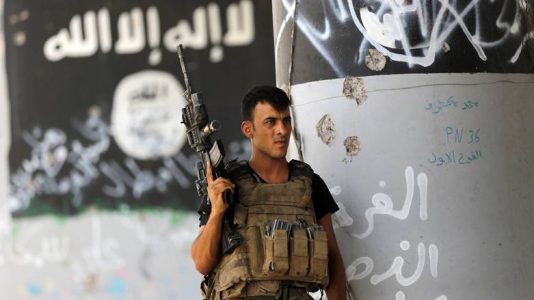
Islamic State violence raises in central Iraq as attacks target civilians and security forces
At least three new attacks suspected to have been carried out by members of the so-called Islamic State on Tuesday targeted civilians and Iraqi security forces in two of the country’s central provinces that have seen a recent increase in such incidents.
A roadside improvised explosive device (IED) blew up under an army vehicle in the vicinity of the Um Hanta village in Diyala province, killing two soldiers, local security sources said. The incident occurred just four kilometers south of the town of Kulajo, close to where multiple attacks claimed by the Islamic State have lately taken place.
In an attack in the provincial center of Baqubah, a sniper killed a police officer near a public university campus, according to a statement from Iraq’s military communications center, the Security Media Cell. It was not immediately clear what group carried out this attack.
Two civilians also were killed by a second bomb that had been planted on the road connecting Quneitra and al-Lazakah villages in Salahuddin province, along the border with neighboring Nineveh. The rural communities are located outside the town of Shirqat, which Iraqi forces freed from the terrorist Islamic State in 2016.
In recent weeks, hardly a day has passed without new bombings, shootings, or other attacks targeting rural populations and various security forces in the Diyala and Salahuddin provinces, as well as the nearby disputed province of Kirkuk. Iraqi forces say remnants of the Islamic State are behind these activities.
As recently as Monday, five Iraqi military personnel were killed and others wounded in three more attacks in Diyala nad Kirkuk that statements from the Security Media Cell said had been carried out by “terrorists.”
The uptick in the terrorist group’s maneuvers indicates its ability to exploit a series of crises currently plaguing Iraq, not least of which is an ongoing security gap most apparent in territories disputed between the Kurdistan Regional Government (KRG) and the federal Iraqi government.
The Islamic State appears to have effectively reorganized its ranks to plan and escalate the violence it has been waging across vulnerable parts of the country. Most of the group’s attacks take place in areas near cities and towns it once controlled before its territorial collapse in 2017 at the hands of Iraqi and Peshmerga forces, backed by Coalition airpower.
Iraqi troops have conducted a series of operations targetting hideouts of the terror group, with a recent air raid using F-16 fighter jets to kill at least 14 “terrorists” and destroy equipment used by sleeper cell agents to launch attacks, the Security Media Cell said on Monday.
KRG officials have repeatedly stressed the necessity of cooperation between the regional and national governments to ensure disputed areas experiencing a security vacuum are effectively protected against Islamic State militants.
On Monday, Kurdistan Region President Nechirvan Barzani reiterated the grave security risk the extremist group still poses to the country as a whole, saying, “ISIS is a serious threat to the Kurdistan Region and to Iraq.”
“We are monitoring and assessing the situation closely in Diyala, Mosul and Makhmour where ISIS attacks have increased.”
Erbil and Baghdad have been working to normalize the security and political situations on the ground in the disputed territories. Although some statements by officials from both Baghdad and Erbil in mid to late 2018 appeared positive, any progress that had been made was derailed by turmoil in the capital after outgoing Prime Minister Adil Abdul Mahdi stepped down in late November due to anti-government protests and the coronavirus pandemic.
Source: Kurdistan 24





